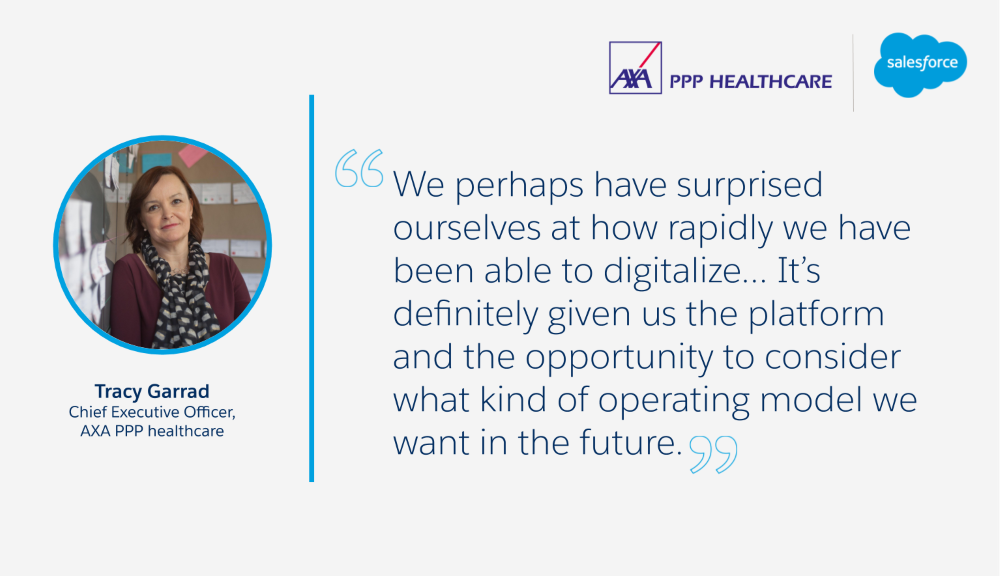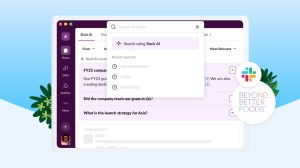Hosting the first ever virtual Salesforce Live EMEA event today, President of Salesforce International Gavin Patterson spoke with Tracy Garrad, CEO of AXA PPP healthcare, one of the UK’s largest private healthcare brands, around how the company has leveraged digital technology to transform their business.
Gavin opened the session with the acknowledgement that every individual, business and community across the world has faced monumental challenges over recent months. The focus of the virtual event was to hear perspectives from companies that have managed to stabilize, reopen and return to growth, and to help inspire other companies across the region to navigate the digital transformation journey.
Gavin started by asking Tracy how the COVID-19 pandemic compares to other challenges she has faced in her career.
Tracy Gerrad’s Opening Comments
I’ve worked in fast-paced transformative business landscapes for nearly 20 years now. But I can safely say that these last three months have probably been the most challenging in my whole career – probably like a lot of other business leaders out there. I took up this role about a year before the COVID-19 pandemic hit. We already defined a pretty significant program of investment to modernize our business, both propositionally but also in terms of infrastructure and systems. But of course the pandemic changed everything almost overnight. It was really important to establish key principles from the outset to help prioritize key decision making.
Q. [Gavin]: As the CEO of AXA PPP healthcare, part of one of the largest insurance organizations in the world supporting people for over 300 years, what was your first priority when it came to stabilizing your business when we shifted to a remote world?
Our key priorities were, firstly, operational resilience – to ensure the continued availability of critical and reliable services for our members – and, secondly, to keep our employees safe. For our people that meant engaging and empowering them as a remote workforce as we had never done before. As well as the obvious challenges of the deployment of physical equipment and training people to use this kit remotely, it also meant creating new HR policies on the fly – a new emergency dependent leave policy, work from home allowances. These policies, as well as our commitment to staff around job security during the lockdown, have paid dividends in terms of the commitment from our people.
From our members’ perspective, we really needed to reassure them that we would be there for them. This was really important when the UK government took the unprecedented decision to take over all private healthcare provision throughout the country – something that had certainly never been in any of our business continuity plans. We understood that customers would start to question the value of the product that they had with us if the core element of private hospital availability was no longer available to them for a period of time.
It was really important to rapidly turnaround some policy adjustments and new propositions; we did this in terms of introducing digital services as well as a ‘customer promise’ around the value that would be returned to customers. Of course that also involved a massive customer communications exercise, regulatory engagement and media engagement along the way. So, I’m really pleased that we’ve been able to get updates to our proposition and that we’ve received great feedback that the customer communication was managed really well.
Q. [Gavin]: How has your business digitized for your employees and customers in this period. What changes do you see lasting for the longer term?
We perhaps have surprised ourselves at how rapidly we have been able to digitalize. In February when we enacted our plans 21% of our workforce were able to work from home; within three weeks, this rose to above 90%. That was a phenomenal achievement and a boost for our leadership team and the whole organisation about our ability to move at pace. We’ve received a lot of feedback from our people about the degree to which they’re feeling they have more of a work-life balance, how much they’re enjoying not commuting – I can certainly say that applies to me as well. It’s definitely given us the platform and the opportunity to consider what kind of operating model we want in the future.
From a customer perspective, it was incredibly important to digitalize our services. We’ve seen a massive uptake in our virtual GP service – in February we expected around 7,000 to 8,000 remote consultants per month. During March that jumped up to 12,000. By the end of May this exceeded 16,000. And interestingly, the demographic group that has changed the most is the over-65s. In a business-as-usual environment, planning the roll-out of digital services, that would have been the group we thought would have the most difficulty shifting behaviour to online services. This shows not to make assumptions about demographics and what’s possible.
With our clinical support service, I think we’ve done something really groundbreaking. With the takeover of the private hospitals, but also with the general concern about going into hospital facilities within three weeks we rapidly implemented a video consultation service for specialist consultations and we’ve got a panel of the UK’s leading clinical experts across a whole series of specialities. In some cases we’ve been able to arrange for a member to see a specialist virtually within four hours from the comfort of their living room; previously, they probably would have waited between seven to ten days. All these things give us a massive opportunity to continue to push forward with digital services both for our staff and our members going forward. We intend to build on this solid foundation over the next couple of years to set us up for future success.














